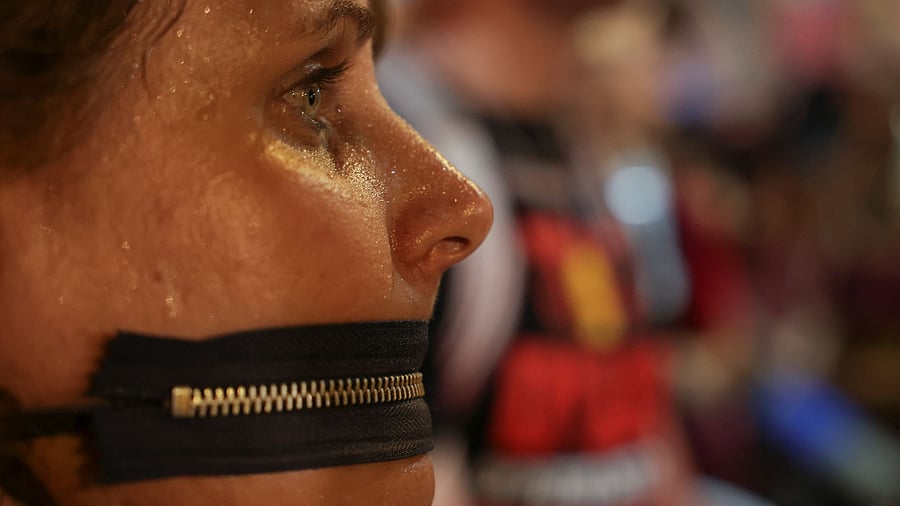
Representative image
Credit: Reuters Photo
Former Karnataka Chief Minister Basavaraj Bommai recently joined the long list of politicians in the state who have obtained gag orders from courts, barring the media from publishing or broadcasting ‘defamatory content’ against them.
While on the one hand, this has perked up public curiosity on what these politicians might be seeking to hide, on the other, questions have been raised on the liberal manner in which Bengaluru courts are doling out such ex-parte orders without giving the media an opportunity to be heard.
Bommai had approached the court after an advocate, K N Jagadeesh, claimed that he possessed some ‘private’ videos of the former CM recorded during his term in office.
Like Bommai, several politicians and bureaucrats have obtained ex-parte orders citing a 1986 judgement of the Karnataka High Court (B N Garudachar v A K Subbaiah) which had held that the right to freedom of speech and expression is restricted by a corresponding duty not to infringe upon the rights of others. However, civil courts and advocates have been accused of selectively reading the High Court order, which had also held that one has the right to expose the corrupt practices of public figures.
The Supreme Court, too, has on various occasions taken an unambiguous view on freedom of speech. In 2017, a bench led by the then Chief Justice had described ex-parte orders as “pre-emptive strikes” on the press.
In one of its latest orders, passed this year (Bloomberg v Zee Entertainment), the Supreme Court noted, “An injunction, particularly ex-parte, should not be granted without establishing that the content sought to be restricted is ‘malicious’ or ‘palpably false’. Granting interim injunctions before the trial commences, in a cavalier manner, results in the stifling of public debate.”
The Supreme Court further said, “Merely recording that a prima facie case exists, that the balance of convenience is in favour of the injunction, and that an irreparable injury would be caused (three-fold test), would not amount to an application of mind by the judge to the facts of the case.”
While stressing that the trial judge should analyse why an ex-parte injunction was essential after setting out the actual facts and contentions made by the complainant, the court also referred to the increasing tendency to resort to ‘SLAPP Suits’ (Strategic Litigation Against Public Participation), a term used to refer to litigation initiated by those wielding enormous power against the media or members of the civil society, to prevent them from knowing about or participating in important affairs of
public interest.
In the recent past, at least 30 politicians from across political parties -- a majority of about 20 being from the BJP -- have obtained injunction orders against the media. While some of them have cited specific instances of how their reputation could be damaged, most others are vague.
For instance, in 2017, the then Rajya Sabha MP Rajeev Chandrasekhar had secured an injunction against a news website for reporting about an alleged conflict of interest in the defence industry space and his investment in a television channel. The court later vacated the stay. In the run up to the 2023 Assembly elections, the then Opposition leader Siddaramaiah got an injunction order against a book that supposedly defamed him and his son.
However, in many other cases, there is no clarity about the grounds on which restraining orders have been sought and obtained. In 2021, when Ramesh Jarkiholi had to step down as minister after a sleaze video allegedly featuring him was telecast on Kannada news channels, six other BJP ministers rushed to the court and got ex-parte injunction orders against media houses. Earlier, H Y Meti, a minister in the Congress government, had to resign under similar circumstances.
There has been intense speculation over the existence of several such videos and it is only natural for the public to assume that those rushing to courts have something to hide. Politicians argue that they are forced to obtain restraining orders as publication of false information can damage their reputations and even end their political careers prematurely. They cite the case of two BJP politicians, one an MLA and another an MP, who were denied party tickets to contest elections after lewd videos featuring them surfaced on social media. Both claimed that the videos were deep fakes.
Such defence notwithstanding, citizens expect politicians to be above board in their personal and public lives and it is only fair that they come out clean and publicly explain the grounds and reasons for obtaining gag orders.
The courts, on their part, should exercise discretion and tread cautiously, intervening only in exceptional cases. Courts should not become platforms for SLAPP suits and, as the apex court rightly observed, “The grant of interim injunction, before the trial commences, often acts as a death sentence for the material sought to be published, well before the allegations have been proven.”
(The writer is a senior journalist based in Bengaluru)